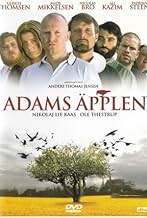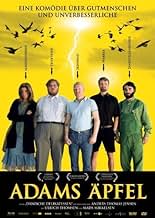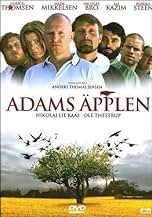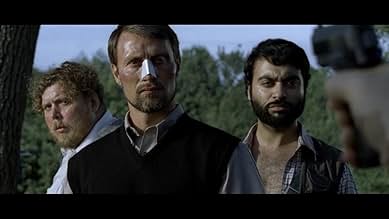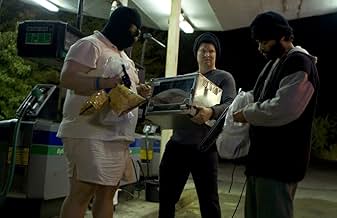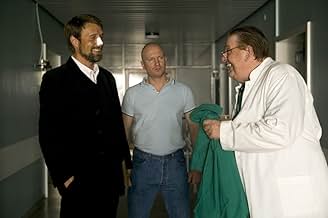NOTE IMDb
7,7/10
57 k
MA NOTE
Un néo-nazi condamné au service communautaire dans une église se heurte au prêtre aveuglément dévotionnel.Un néo-nazi condamné au service communautaire dans une église se heurte au prêtre aveuglément dévotionnel.Un néo-nazi condamné au service communautaire dans une église se heurte au prêtre aveuglément dévotionnel.
- Réalisation
- Scénario
- Casting principal
- Récompenses
- 20 victoires et 13 nominations au total
Rasmus Rise
- Ung fyr på tankstation #1
- (as Rasmus Rise Michaelsen)
Jacob-Ole Remming
- Ung fyr på tankstation #2
- (as Jacob Ole Remming)
Per Holm Henriksen
- Patient
- (non crédité)
Avis à la une
"Let's stop with the accusations. It was an old cat. He just happened to fall down while we were shooting."
There are dark comedies. There are pitch black comedies. And then, there's Adam's Apples.
If you want to watch a movie that takes some of the most depressing, horrible things you can think of, and makes them absolutely hilarious, this is the movie for you.
I won't spoil much of the story, as watching what unexpectedly happens throughout is one of the pleasures of the movie. It begins with a priest named Ivan driving an unrepentant neo-Nazi named Adam from prison to the church where he will be performing his community service. Ivan gives Adam the choice of one goal to set for himself to complete, before he leaves. Ivan, completely uncaring, chooses to make an apple pie from the apple tree outside the church, once they are ripe.
From there, things quickly get out of hand. Let's just say that the sensitive need not apply.
I recommend Adam's Apples to people with a dark sense of humor, who are fine with laughing at incredibly inappropriate (yet incredibly amusing) things. This movie was made for people like you and me.
I'm not referring to low-brow humor. This is a different animal. An utterly unique (as far as my experience goes), intelligent comedy that ultimately brings sunshine forth from some of the darkest clouds you've ever seen (both figuratively and literally).
There are dark comedies. There are pitch black comedies. And then, there's Adam's Apples.
If you want to watch a movie that takes some of the most depressing, horrible things you can think of, and makes them absolutely hilarious, this is the movie for you.
I won't spoil much of the story, as watching what unexpectedly happens throughout is one of the pleasures of the movie. It begins with a priest named Ivan driving an unrepentant neo-Nazi named Adam from prison to the church where he will be performing his community service. Ivan gives Adam the choice of one goal to set for himself to complete, before he leaves. Ivan, completely uncaring, chooses to make an apple pie from the apple tree outside the church, once they are ripe.
From there, things quickly get out of hand. Let's just say that the sensitive need not apply.
I recommend Adam's Apples to people with a dark sense of humor, who are fine with laughing at incredibly inappropriate (yet incredibly amusing) things. This movie was made for people like you and me.
I'm not referring to low-brow humor. This is a different animal. An utterly unique (as far as my experience goes), intelligent comedy that ultimately brings sunshine forth from some of the darkest clouds you've ever seen (both figuratively and literally).
I love Danish films and this is a wonderful movie with magnificent acting.
Its so funny and sad at times.
The triumph of good on evil.
Anders Thomas Jensen has with his earlier films, "De grønne slagtere" and "Blinkende lygter", convinced the audience of his scriptwriting talents, especially his distinct sense of dark humour. "Adams æbler", clearly a more ambitious project, is now gaining him recognition as a director with a vision. Apart from merely being amusing and intriguing as a comedy, the film succeeds in communicating a meaningful message to the audience, while being deep and sufficiently complex in its values. Indeed, the film's central theme questions our central notion of good and evil without giving definite conclusions: whether there really exist absolute values is eventually left unanswered. Which is better of the two: the blindly devoted and fanatically optimistic priest Ivan or the nihilistic neo-Nazi Adam? Jensen attempts to twist the basic setting by making Ivan appear rather unsympathetic: while he helps people as a priest, he doesn't seem to do it because of them but rather because of his faith alone. It is often Adam, who notices this, not failing to observe (almost objecting to) the weaknesses of Ivan's behaviour, and yes, it is the cold-hearted, evil Adam who seems to care more and more as the story goes on.
It is difficult to sum up the whole film with only a couple of words. Mixing biblical allegories, especially the story of Job (the Fall being also an essential part of the film, yet not actually in the plot itself), with modern drama and dark comedy, Adams æbler does not fit into traditional categories. As a comedy, it doesn't straightforwardly tell what to laugh at, but the humorous is intertwined with absolutely serious elements. Thus the movie examines the outskirts of comedy and humour: it encourages the viewer to ponder whether the events are humorous or not. Even the music doesn't correspond with the comedy genre at all, but is constantly foreboding and solemn. It is a versatile film, but despite the exceptional blend, it succeeds in keeping the story together. And it's a good story.
Characters are well built and well played. Ulrich Thomsen gives perhaps his best performance to date as Adam (challenged only by his role in Festen), and so does Mads Mikkelsen as Ivan. Nicolas Bro, Ali Kazim and Paprika Steen must also be commended for their roles. Bro is a kleptomaniac and a drunkard, Kazim plays an immigrant Robin Hood gone bad, and Paprika Steen delivers a steady performance as an unbalanced future mother considering abortion. Special mention goes to Ole Thestrup as the devilishly comical (almost malicious, though we are not quite sure) Dr. Kolberg, who, while joking with his patients misfortunes in lovable dialect and showing virtually no respect to any taboos, fails to demonstrate signs of empathy or other proper human feelings. "He's done for. You could use him as a crapper. Have you had coffee?" As to its thematics, the film is utterly uncompromising: in its treatment of today's starkest evils, it never offers an apology or a clear moral; the final return towards the acceptable, so frequent in the comedy genre, doesn't quite occur. Instead, none of the problems are resolved or even discussed properly rather, they are laughed at. As in his earlier films and as many of his Danish colleagues have been doing, Jensen is examining the limits of comedy how far can one go in making fun of sensitive matters such as abuse, rape, violence, racism, disability and so on. Jensen is a provocateur: he discusses ugly subjects with little discretion, avoiding compromises. Like Dr. Kolberg, he wants to talk about things with their real names and discuss them as they are. But in addition, the comedy genre allows him to treat these issues openly.
It's about the battle between good and evil: Ivan sees only the good, Adam only the evil. Ivan tries to make Adam see the good, Adam attempts to force Ivan into seeing the evil around him. Ivan preaches about the distinction between good and evil, pointing out how much the modern world is in confusion with these terms and how much our common conceptions have changed with time. This is ironical, because the movie questions the whole distinction: in other words, it questions the consequences of the fall (not uncommon in Danish lay theology). While not making an actual statement, it points out that good and evil are, at least to a great extent, constructs of society and dependant on the point of view. On the other hand, by making Ivan absolutely blind to misfortunes in his life, it illustrates how it is possible to see good in everything, and close ones eyes from everything bad.
Adams æbler is a very interesting movie. It entertains, shocks, provokes, and finally, redeems. Whether this redemption is favourable as such, is left to the viewer to judge. All in all, it's an absolutely surprising masterwork, one of the rare gems. 8/10.
It is difficult to sum up the whole film with only a couple of words. Mixing biblical allegories, especially the story of Job (the Fall being also an essential part of the film, yet not actually in the plot itself), with modern drama and dark comedy, Adams æbler does not fit into traditional categories. As a comedy, it doesn't straightforwardly tell what to laugh at, but the humorous is intertwined with absolutely serious elements. Thus the movie examines the outskirts of comedy and humour: it encourages the viewer to ponder whether the events are humorous or not. Even the music doesn't correspond with the comedy genre at all, but is constantly foreboding and solemn. It is a versatile film, but despite the exceptional blend, it succeeds in keeping the story together. And it's a good story.
Characters are well built and well played. Ulrich Thomsen gives perhaps his best performance to date as Adam (challenged only by his role in Festen), and so does Mads Mikkelsen as Ivan. Nicolas Bro, Ali Kazim and Paprika Steen must also be commended for their roles. Bro is a kleptomaniac and a drunkard, Kazim plays an immigrant Robin Hood gone bad, and Paprika Steen delivers a steady performance as an unbalanced future mother considering abortion. Special mention goes to Ole Thestrup as the devilishly comical (almost malicious, though we are not quite sure) Dr. Kolberg, who, while joking with his patients misfortunes in lovable dialect and showing virtually no respect to any taboos, fails to demonstrate signs of empathy or other proper human feelings. "He's done for. You could use him as a crapper. Have you had coffee?" As to its thematics, the film is utterly uncompromising: in its treatment of today's starkest evils, it never offers an apology or a clear moral; the final return towards the acceptable, so frequent in the comedy genre, doesn't quite occur. Instead, none of the problems are resolved or even discussed properly rather, they are laughed at. As in his earlier films and as many of his Danish colleagues have been doing, Jensen is examining the limits of comedy how far can one go in making fun of sensitive matters such as abuse, rape, violence, racism, disability and so on. Jensen is a provocateur: he discusses ugly subjects with little discretion, avoiding compromises. Like Dr. Kolberg, he wants to talk about things with their real names and discuss them as they are. But in addition, the comedy genre allows him to treat these issues openly.
It's about the battle between good and evil: Ivan sees only the good, Adam only the evil. Ivan tries to make Adam see the good, Adam attempts to force Ivan into seeing the evil around him. Ivan preaches about the distinction between good and evil, pointing out how much the modern world is in confusion with these terms and how much our common conceptions have changed with time. This is ironical, because the movie questions the whole distinction: in other words, it questions the consequences of the fall (not uncommon in Danish lay theology). While not making an actual statement, it points out that good and evil are, at least to a great extent, constructs of society and dependant on the point of view. On the other hand, by making Ivan absolutely blind to misfortunes in his life, it illustrates how it is possible to see good in everything, and close ones eyes from everything bad.
Adams æbler is a very interesting movie. It entertains, shocks, provokes, and finally, redeems. Whether this redemption is favourable as such, is left to the viewer to judge. All in all, it's an absolutely surprising masterwork, one of the rare gems. 8/10.
Mean, very funny satire with amazing performances by all - and with an absolutely outstanding Mads Mikkelsen. This is a very black comedy, but also a very smart one that shows once more that Scandinavian - and especially Danish - cinema had some of the most diverse and creative output in Europe over the last two decades. 8 stars out of 10.
In case you're interested in more underrated masterpieces, here's some of my favorites:
imdb.com/list/ls070242495
In case you're interested in more underrated masterpieces, here's some of my favorites:
imdb.com/list/ls070242495
I watched this film now several times: the dark humor, brilliant acting, good story arc, consistent character development and well done (visual) narration is beautiful to watch - everytime.
If you are not afraid of grotesque situations, some blood, dark jokes and creepy characters - this is your choice tonight.
If you are not afraid of grotesque situations, some blood, dark jokes and creepy characters - this is your choice tonight.
Le saviez-vous
- AnecdotesAccording to the making of-featurette on the DVD, the scene with the crows eating apples was planned to be computer-generated, until a few Czechs showed up with four boxes of real trained crows, and everything worked out fine for a minimum cost.
- GaffesIvan's metal nose cap disappears when he confronts Adam in the church, to reappear in the following scenes.
- Citations
Dr. Kolberg: Adam, this makes no sense at all. I am a man of science, I believe in numbers and charts. Goddamnit, I wanna go someplace, where people die when they are sick, and don't sit in the yard eating cowboy toast when they have been shot through the head.
- ConnexionsFeatured in Dansk films bedste: På grænsen, Fester og Tro (2022)
- Bandes originalesHow Deep Is Your Love
Written by Barry Gibb, Robin Gibb and Maurice Gibb (as Gibb/Gibb/Gibb)
Performed by Take That
© BMG Music Publishing / Warner/Chappell Music Scand. AB
Meilleurs choix
Connectez-vous pour évaluer et suivre la liste de favoris afin de recevoir des recommandations personnalisées
- How long is Adam's Apples?Alimenté par Alexa
Détails
- Date de sortie
- Pays d’origine
- Sites officiels
- Langue
- Aussi connu sous le nom de
- Les pommes d'Adam
- Lieux de tournage
- Sociétés de production
- Voir plus de crédits d'entreprise sur IMDbPro
Box-office
- Montant brut aux États-Unis et au Canada
- 1 305 $US
- Week-end de sortie aux États-Unis et au Canada
- 1 305 $US
- 18 mars 2007
- Montant brut mondial
- 2 421 577 $US
Contribuer à cette page
Suggérer une modification ou ajouter du contenu manquant







